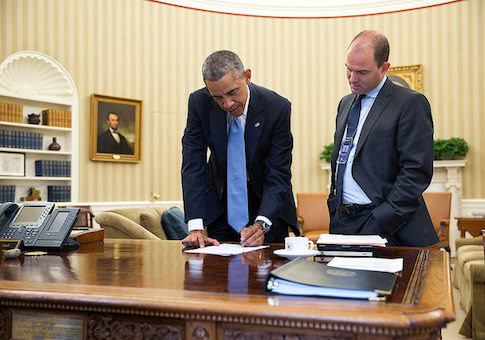Nothing has been more tedious over the last year than the constant reminders that good journalism is "now more important than ever." The implication, of course, is that solid, groundbreaking reporting was not as essential so long as a liberal Democrat was in power. I've long assumed that the factotums mouthing such clichés lack the self-awareness to understand the true import of their words. But maybe I've been wrong. Recent days brought evidence that, no, liberals really mean it: the only meaningful investigative work is that which reflects poorly on Republicans.
Earlier this week, for example, Politico Magazine published a story by Josh Meyer headlined "The secret backstory of how Obama let Hezbollah off the hook." This epic and copiously sourced piece relates how, "in its determination to secure a nuclear deal with Iran, the Obama administration derailed an ambitious law enforcement campaign targeting drug trafficking by the Iranian-backed terrorist group Hezbollah, even as it [Hezbollah, not the Obama administration] was funneling cocaine into the United States."
The law enforcement program in question is called Project Cassandra, which for eight years "used wiretaps, undercover operations, and informants to map Hezbollah's illicit networks, with the help of 30 U.S. and foreign security agencies." However, as investigators came closer to unraveling the globe-spanning conspiracy, "The Justice Department declined requests by Project Cassandra and other authorities to file criminal charges against major players such as Hezbollah's high-profile envoy to Iran, a Lebanese bank that allegedly laundered billions in alleged drug profits, and a central player in a U.S.-based cell of the Iranian paramilitary Quds force." Linger over that last item for a second.
Meyer cites "dozens" of interviews and documents as evidence. He quotes a veteran U.S. intelligence operative—the sort of guy whose every utterance is anonymously paraded in the newspapers and magazines so long as it's anti-Trump—who says, "This was a policy decision, it was a systematic decision." And the reason for this systematic decision, presumably, was to make Hezbollah's Iranian backers more willing to deal with the Obama administration on nukes.
Meyer points to congressional testimony from former Treasury official Katherine Bauer, who said last February: "These investigations were tamped down for fear of rocking Iran and jeopardizing the nuclear deal." President Obama, in other words, slow-walked counter-narcotics efforts for the inane "greater good" of paying Iran billions to pretend to shut down its nuclear program for ten years. This is the very definition of "stupid stuff."
Meyer is not an ideologue, not a partisan, not a quack. He worked for the Los Angeles Times, for NBC News, and for the Medill National Security Journalism Initiative before joining Politico as a senior investigative reporter. His Twitter feed contains plenty of criticisms of President Trump and congressional Republicans. And his story is solid. He explores different angles and gives his subjects fair comment. He's produced a classic example of the good journalism that our betters tell us we need more than ever.
Except our betters don't like it, not one bit, because it reflects poorly on the most significant (yet dubious and controversial) achievement of Barack Obama's second term. In a tactic familiar to opponents of the Iran deal, the criticism is aimed not at the facts behind Meyer's article but at Meyer himself. "It's a shabby neocon hit piece," says Valerie Plame's bestie Joe Cirincione. "A disgusting hit job by both the cabal of people with this agenda and by the reporter who paid lip service to the criticisms of this group," says Brian O'Toole, a "non-resident senior fellow" at the Atlantic Council. Neocon … cabal … I wonder whom these guys are referring to? (Wink, wink, nudge, nudge.)
"Non-fact based anti-Iran Deal propaganda," sneers former deputy national security adviser and creative writing expert Ben Rhodes. "The story is so manufactured out of thin air that it's hard to push back except to say that it's a figment of the imagination of two very flawed sources," says Tommy Vietor, who has a podcast. Note that Vietor is obviously wrong: the piece has far more than "two very flawed sources." Note as well that neither Rhodes nor Vietor ever actually bother to challenge those sources or the facts provided to Politico.
Vietor went on to tell Meyer over Twitter that Meyer's "on the record sources have undisclosed anti-Iran deal bias." And Ned Price, who worked for Rhodes, called the Politico article an "anti-Iran deal screed" based on sources with "undisclosed anti-Iran deal bias." For shame! Before we go any further, let me disclose my anti-Iran deal bias right now.
A Twitter lefty named Adam Khan expanded on these McCarthy-like observations, warning that if journalists "go out of their way to hide experts' links to donors, agenda, that should be a big red flag." Writers should know better than to quote the cabal of neocon donors with agendas, is his point.
So weak was the response to Meyer's scoop that by the end of their Twitter exchange Vietor was wishing him happy holidays and saying it's "not personal just disagree on policy." Vietor missed the memo; we say Merry Christmas in Trump's America. Besides, Meyer wasn't writing about policy. He was relating information. What former Obama officials were reacting to wasn't some innovative argument against the Iran deal, but damning evidence of Obama's reckless disregard for national security in pursuit of a fantastic rapprochement with Iran. And their outrage reminds us that what the left needs now more than ever isn't journalism. It's resistance to Trump.
